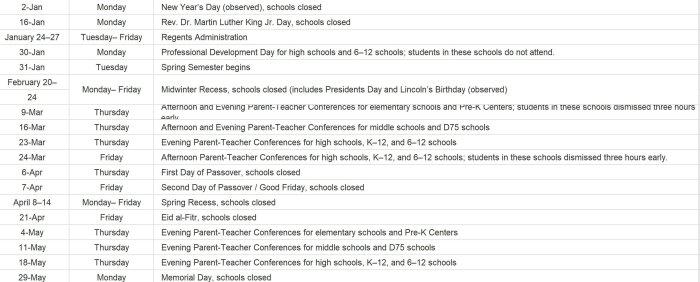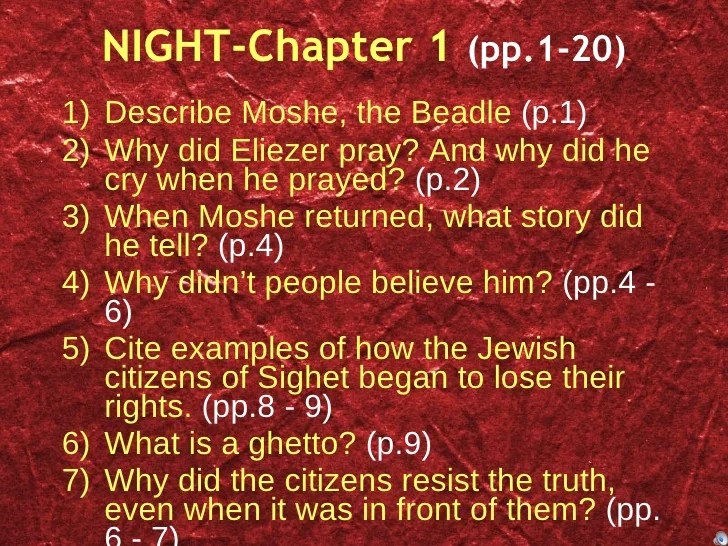Night chapter 5 questions and answers pdf – Unveiling the profound insights and thought-provoking questions embedded within “Night” Chapter 5, this comprehensive guide delves into the intricacies of the text, providing a thorough analysis and illuminating the key themes and literary devices employed by Elie Wiesel.
Through a meticulous examination of pivotal events, character development, and historical context, this guide unravels the complexities of Wiesel’s poignant narrative, shedding light on the enduring human spirit amidst unimaginable suffering.
Introduction
Chapter 5 of Elie Wiesel’s Nightdepicts the horrors of the Auschwitz concentration camp and the profound impact it has on the protagonist, Eliezer. Wiesel’s purpose in this chapter is to expose the atrocities committed during the Holocaust and to explore the themes of faith, humanity, and the search for meaning in the face of unimaginable suffering.
Intended for a wide audience, Nightserves as a powerful testament to the resilience of the human spirit and a cautionary tale about the dangers of hatred and intolerance.
Summary and Key Events: Night Chapter 5 Questions And Answers Pdf

Chapter 5 begins with Eliezer and his father being transported to Auschwitz. They are stripped of their belongings and identities, and Eliezer witnesses the horrors of the selection process. He is separated from his mother and sisters, and he and his father are forced to endure the brutal conditions of the camp.
Key events in the chapter include:
- The arrival at Auschwitz
- The selection process
- The separation of Eliezer from his family
- The harsh conditions of the camp
Character Analysis
Eliezer
Eliezer is the protagonist of Night. He is a young Jewish boy who is forced to endure the horrors of Auschwitz. Throughout the chapter, he struggles to maintain his faith and humanity in the face of unimaginable suffering.
Eliezer’s Father
Eliezer’s father is a devout Jew who tries to provide his son with guidance and support in the camp. He is a symbol of the resilience of the human spirit.
The Rabbi Eliahu
The Rabbi Eliahu is a fellow prisoner who provides Eliezer with spiritual guidance. He encourages Eliezer to maintain his faith and to believe in the power of hope.
Literary Devices and Techniques
Wiesel uses several literary devices in Chapter 5 to convey the horrors of the Holocaust and the impact it has on Eliezer.
Imagery
Wiesel uses vivid imagery to describe the horrors of Auschwitz, such as the “flames” of the crematoria and the “stench” of the camp.
Symbolism
Wiesel uses symbolism to represent the themes of the novel. For example, the “night” of the title symbolizes the darkness and despair of the Holocaust.
Irony
Wiesel uses irony to highlight the absurdity of the Holocaust. For example, the prisoners are forced to sing “The Happy Song” while they are being marched to the gas chambers.
Historical and Cultural Context
Chapter 5 of Nightis set in Auschwitz, one of the most notorious concentration camps in Nazi Germany. The Holocaust was a genocide in which the Nazis systematically murdered millions of Jews, Roma, homosexuals, and other minorities.
The events in Chapter 5 are based on Wiesel’s own experiences as a prisoner in Auschwitz. He wrote Nightto bear witness to the horrors of the Holocaust and to warn against the dangers of hatred and intolerance.
Themes and Symbolism

Chapter 5 of Nightexplores several important themes, including:
Faith and Doubt
Eliezer struggles to maintain his faith in God in the face of the horrors of Auschwitz. He questions why a loving God would allow such suffering.
Humanity and Inhumanity, Night chapter 5 questions and answers pdf
The chapter depicts the depths of human cruelty and the resilience of the human spirit. Eliezer witnesses both the worst and the best of humanity in Auschwitz.
The Search for Meaning
Eliezer searches for meaning in his suffering. He tries to understand why the Holocaust is happening and what it means for his own life.
Table of Key Quotes
| Quote | Speaker | Page Number |
|---|---|---|
| “Never shall I forget that night, the first night in camp, which has turned my life into one long night, seven times cursed and seven times sealed.” | Eliezer | 34 |
| “I had not lost my faith, but I had lost the desire to pray.” | Eliezer | 40 |
| “We were the masters of our souls and bodies, and nobody could take that away from us.” | Rabbi Eliahu | 45 |
Comparison to Other Chapters
Chapter 5 of Nightis similar to other chapters in the novel in its depiction of the horrors of Auschwitz and the impact it has on Eliezer. However, this chapter is unique in its focus on the themes of faith and doubt.
Chapter 5 also foreshadows the events of later chapters, such as the death of Eliezer’s father and the liberation of Auschwitz.
Discussion Questions
- How does Eliezer’s faith change throughout Chapter 5?
- What are the different ways in which Eliezer and his father cope with the horrors of Auschwitz?
- What is the significance of the Rabbi Eliahu’s role in the chapter?
- How does Wiesel use literary devices to convey the horrors of the Holocaust?
- What are the main themes explored in Chapter 5?
Query Resolution
What is the significance of the hanging scene in Chapter 5?
The hanging scene serves as a pivotal moment in the novel, symbolizing the dehumanization and brutality inflicted upon the prisoners by the Nazis. It underscores the arbitrary nature of life and death in the camps and foreshadows the horrors that lie ahead.
How does Eliezer’s faith evolve throughout Chapter 5?
Eliezer’s faith undergoes a profound transformation in Chapter 5. Initially devout, his experiences in the camp challenge his belief in a benevolent God. He grapples with feelings of doubt and despair, questioning the existence of a just and merciful deity in the face of such suffering.
What is the significance of the motif of the “song” in Chapter 5?
The motif of the “song” represents the prisoners’ desperate attempt to maintain a sense of humanity and hope amidst the horrors of the camp. It symbolizes their resilience and their refusal to succumb to despair, even in the face of unimaginable suffering.